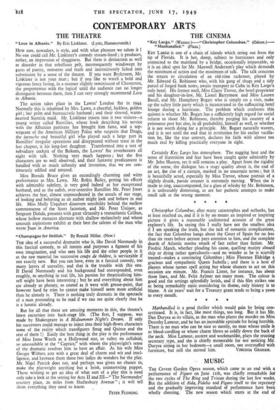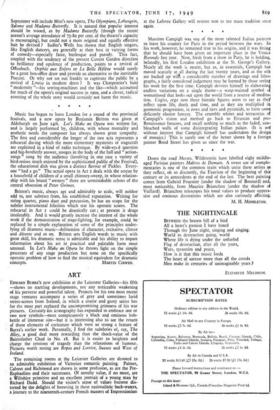MUSIC
THE Covent Garden Opera season, which came to an end with a performance of Figaro on June nth, was chiefly remarkable fot the two cycles of The Ring and Tristan during the last few weeks, But the addition of Aida, Fidelio and Figaro itself to the repertory and the gradually improving standard of performance have been wholly cheering. The new season which starts at the end of September will include Bliss's new opera, The Olympians, Lohengrin, Salome and Madame .Butterfly. It is natural that popular interest should be wooed, as by Madame Butterfly (though the recent season's average attendance of 75-80 per cent. of the theatre's capacity is encouraging), but could not a more original and equally effective bait be devised ? Sadler's Wells has shown that English singers, like English- dancers, are generally at their best in varying forms of comedy—especially farce, burlesque and parody. This fact, coupled with the tendency of the present Covent Garden direction to brilliance and opulence of production, points to a revival of Offenbach. Orphee crux Enfers or La Belle Helene would surely be a great box-office draw and provide an alternative to the inevitable Puccini. Or why not set out frankly to captivate the public by a revival of Louise in modern dress ? It was Charpentier's bold " modernity "—his sewing-machines and the like—which accounted for much of the opera's original success in 19oo, and a clever, radical resetting of the whole story would certainly not harm the music.
• Music has begun to leave London for a round of the provincial festivals, and a new opera by Benjamin Britten was given at Aldeburgh on June 14th. Let's Make an Opera was written for, and is largely performed by, children, with whose mentality and aesthetic needs the composer has always shown great sympathy. The first and considerably the longer of the two acts represents a rehearsal duting which the more elementary mysteries of stagecraft are explained in a kind of radio technique. By wide-eyed `question and big-brotherly answer, stooges in the body of the hall and " action- songs " sung by the audience (involving in one case a variety of bird-noises much enjoyed by the sophisticated public of the Festival), the educational dish was given a distinct flavour of Pickles. Every- one "had a go." The actual opera in Act 2 deals with the rescue by a household of children of a small chimney-sweep, in whose relation- ship with his brutal " owners " there are unmistakable echoes of the central obsession of Peter Grimes.
Britten's music, always apt and admirably to scale, will neither add to, nor subtract from, his established reputation. Writing for string quartet, piano duet and percussion, he has no scope for the subtler instrumental felicities which star his operatic scores. The rehearsal in Act z could be drastically cut ; at present it drags intolerably. And it would greatly increase the interest of the whole work if the demonstration of stage-lighting, for example, could be replaced by a simple explanation of some of the principles under- lying all dramatic music—delineation of character, recitative, climax and détente and so on. Britten sets English words to music with great skill, his dramatic sense is admirable and his ability to impart information about his art in practical and palatable form most unusual. In Let's Make an Opera he throws light on the simple processes of any stage production but none on the specifically operatic problem of how to find the musical equivalent for dramatic







































 Previous page
Previous page